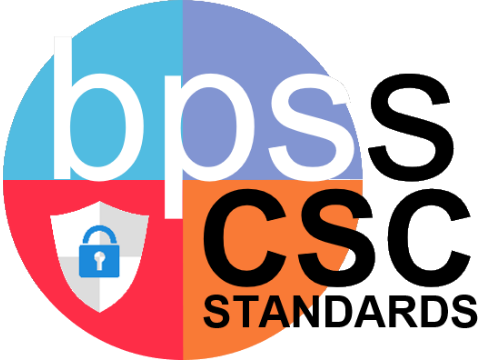BPS District Computer Science and Cybersecurity Standards Book
Completion requirements
K-12 Grade Levels
Grade 05
CSC-05.TS TS Technology Systems
Sub-Concepts
(NI) Network & Internet - Networks link computers and devices locally and around the world allowing people to access and communicate information.
(HS) Hardware & Software - Devices, hardware, and software work together as a system to accomplish tasks..
(T) Troubleshooting - Strategies for solving technology system problems.
- CSC-05.TS_NI.1 Understand that information is sent and received across physical or wireless paths.
- CSC-05.TS_HS.1 Compare and contrast physical and virtual systems.
- CSC-05.TS_HS.2 Independently use a computing device to perform a variety of tasks. (Continued growth)
- CSC-05.TS_HS.3 Recognize users have different technology needs and preferences. (Continued growth)
- CSC-05.TS_T.1 With guidance, apply basic troubleshooting strategies. (Continued growth)
CSC-05.CT CT Computational Thinking
Sub-Concepts
(PSA) Problem Solving & Algorithms - Strategies for understanding and solving problems.
(DCA) Data Creation & Analysis - Data can be collected, used, and presented with computing devices or digital tools.
(DD) Development & Design - Design processes to create new, useful, and imaginative solutions to problems.
- CSC-05.CT_PSA.1 Create a sequence of instructions from a previous decomposed task.
- CSC-05.CT_PSA.2 Debug a program that includes sequencing, loops, or conditionals.
- CSC-05.CT_PSA.3 Work collaboratively to explore multiple solutions to a task.
- CSC-05.CT_DCA.1 Organize and present collected data to highlight comparisons and support a claim.
- CSC-05.CT_DD.1 Independently and collaboratively create programs that use sequencing, loops, and conditionals. (Continued growth)
- CSC-05.CT_DD.2 Create solutions to problems using a design method.
CSC-05.IL IL Information Literacy
Sub-Concepts
(A) Access - Effective search strategies can locate information for intellectual or creative pursuits.
(E) Evaluate - Information sources can be evaluated for accuracy, currency, appropriateness, and purpose.
(C) Create - It is important to both consume and produce information to be digitally literate.
(IP) Intellectual Property - Respect for the rights and obligations of using and sharing intellectual property.
- CSC-05.IL_A.1 Refine your keyword search to improve your results.
- CSC-05.IL_E.1 With guidance, use a strategy to evaluate information for research purposes. (Continued growth)
- CSC-05.IL_C.1 Independently or collaboratively, create a digital product using two or more tools.
- CSC-05.IL_IP.1 With guidance, demonstrate an understanding of ethical issues in copyright and fair use.
- CSC-05.IL_IP.2 With guidance, create a citation. (Continued growth)
- CSC-05.IL_IP.3 With guidance, use strategies to avoid piracy and plagiarism. (Continued growth)
CSC-05.CS CS Computers in Society
Sub-Concepts
(IC) Impacts of Computing - Past, present, and possible future impact of technology on society.
(SI) Social Interactions - Technology facilitates collaboration with others.
- CSC-05.CS_IC.1 Explain how technologies can change the future.
- CSC-05.CS_SI.1 With guidance, use collaborative technology to compare and contrast diverse perspectives.
CSC-05.DC DC Digital Citizenship
Sub-Concepts
(SE) Safety & Ethics - There are both positive and negative impacts in social and ethical behaviors for using technology.
(RU) Responsible Use - Respect and dignity in virtual communities.
(DI) Digital Identity - Responsibilities and opportunities of living, learning and working in an interconnected digital world.
- CSC-05.DC_SE.1 Recognize that there are real-world cybersecurity problems (i.e.hacking) when interacting online. (CYSEC)
- CSC-05.DC_SE.2 Create secure authentication to insure privacy. (CYSEC) (Continued growth)
- CSC-05.DC_SE.3 Recognize that data-collection technology can be used to track navigation online. (CYSEC) (Continued growth)
- CSC-05.DC_SE.4 Apply strategies to keep your private information safe online. (CYSEC)
- CSC-05.DC_RU.1 Demonstrate an understanding of the appropriate use of technology and information and the consequences of inappropriate use.
- CSC-05.DC_RU.2 Use strategies that prevent and deal responsibly with cyberbullying and inappropriate behavior.
- CSC-05.DC_RU.3 Develop a code of conduct, explain, and practice appropriate behavior and responsibilities while participating in an online community. (Continued growth)
- CSC-05.DC_RU.4 Comply with Acceptable Use Policies.
- CSC-05.DC_DI.1 Explain the importance of your digital identity. (Continued growth)






